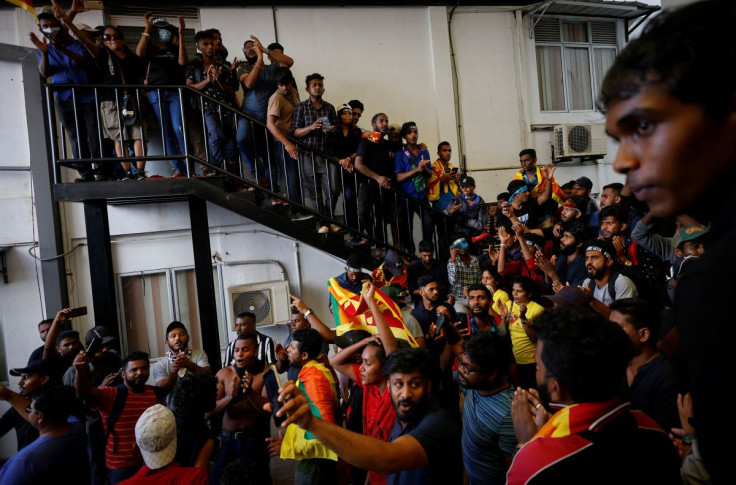Sri Lankans' Fury Turns On Wickremesinghe After President Flees

Ranil Wickremesinghe, who was named acting president of Sri Lanka on Wednesday as its political and economic crisis deepened, is tantalisingly close to the pinnacle of power but may not get much time to enjoy it.
When he was made prime minister in May, it was the sixth time the opposition lawmaker - known domestically as an effective political operator - had held the post.
His appointment was welcomed by some at the time, because he was not from the ruling Rajapaksa dynasty that has become the reviled symbol of social chaos and did not belong to the dominant parliamentary party that forms the family's power base.
That has not been enough to cushion him from growing anger among ordinary Sri Lankans, who have swarmed the streets of Colombo in recent days and stormed key government buildings, prompting President Gotabaya Rajapaksa to flee abroad.
It leaves Wickremesinghe nominally in charge but on an acting basis, as Gotabaya prevaricates over formally rescinding his role. Much depends on what Wickremesinghe does next.
His first step as acting president was to announce he would be declaring a nationwide state of emergency and a curfew in the west of the country where the commercial capital Colombo is located. Those orders have yet to be officially enacted.
Wickremesinghe had previously offered to resign as prime minister, and if he did the speaker would become acting president until a new leader was elected on July 20. But he has yet to step aside, fuelling fury on the streets.
On Wednesday, protesters surged into the prime minister's office despite police stationed outside firing teargas. Wickremesinghe urged people in a video message to respect the constitution. His whereabouts were unknown.
Sri Lanka's defence chief, General Shavendra Silva, called for calm.
"We have requested political leaders to decide the way forward till a new president is sworn in and notify us and the public by this evening," Silva said.
COUNTRY IN TURMOIL
The sole member of the opposition United National Party (UNP), Wickremesinghe was sworn in by Rajapaksa in May, replacing the president's brother, Mahinda Rajapaksa, who resigned amid earlier street protests.
"We are facing a crisis, we have to get out of it," Wickremesinghe told Reuters as he left a temple in the main city of Colombo shortly after his swearing-in. Asked whether there was a possible solution, he replied: "Absolutely."
That solution has not come yet. Power blackouts, soaring prices, fuel shortages and collapsing hard currency reserves are signs of how vulnerable Sri Lanka's economy is.
The country is in talks with the International Monetary Fund (IMF) for a bailout, and has relied on credit from India and other Asian nations to make ends meet this year.
Wickremesinghe, who married a university lecturer in 1995, is from a prominent family of politicians and businessmen with large interests in the media.
He has been thrust into the political spotlight before.
In 1978, he was made the country's youngest cabinet minister at the age of 29 by his uncle, President Junius Jayewardene. He became party leader in 1994 after assassinations wiped out several of the party's more senior members.
In contrast to Mahinda Rajapaksa, he has little support beyond wealthy urban voters. Wickremesinghe is the only UNP lawmaker in the country's 225-seat parliament.
The economic liberal already has experience with the IMF. Sri Lanka last had an IMF programme in 2016 during one of his tenures as prime minister.
He has also built relationships with regional powers India and China, key investors and lenders who vie for influence over the island nation that lies along busy shipping routes linking Asia to Europe.
Some analysts said he was a wily politician, a shrewd dealmaker and someone capable of playing the long game.
But he has not been able to escape the wave of unrest sweeping Sri Lanka, even if he has not always seen eye to eye with the now-reviled Rajapaksa family that has dominated politics for much of the last 20 years.
In 2019, then-president Maithripala Sirisena fired Wickremesinghe, replacing him with Mahinda Rajapaksa, a decision that was subsequently ruled as unconstitutional.
© Copyright Thomson Reuters 2024. All rights reserved.







